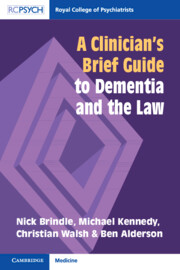Book contents
- A Clinician’s Brief Guide to Dementia and the Law
- A Clinician’s Brief Guide to Dementia and the Law
- Copyright page
- Contents
- Preface
- Common Abbreviations
- Chapter 1 Dementia
- Chapter 2 Dementia
- Chapter 3 Dementia
- Chapter 4 The Mental Capacity Act 2005
- Chapter 5 The Mental Health Act 1983
- Chapter 6 The Care Act 2014
- Chapter 7 Assessment of Capacity
- Chapter 8 The Diagnosis of Dementia
- Chapter 9 Care and Treatment Issues and the Law
- Chapter 10 Deprivation of Liberty
- Chapter 11 Discharge from Hospital
- Chapter 12 Abuse and Safeguarding
- Chapter 13 The Courts and Tribunals
- Chapter 14 The Interface between Dementia and the Criminal Justice System
- Book part
- References
- Index
Chapter 8 - The Diagnosis of Dementia
Planning for the Future
Published online by Cambridge University Press: 20 July 2023
- A Clinician’s Brief Guide to Dementia and the Law
- A Clinician’s Brief Guide to Dementia and the Law
- Copyright page
- Contents
- Preface
- Common Abbreviations
- Chapter 1 Dementia
- Chapter 2 Dementia
- Chapter 3 Dementia
- Chapter 4 The Mental Capacity Act 2005
- Chapter 5 The Mental Health Act 1983
- Chapter 6 The Care Act 2014
- Chapter 7 Assessment of Capacity
- Chapter 8 The Diagnosis of Dementia
- Chapter 9 Care and Treatment Issues and the Law
- Chapter 10 Deprivation of Liberty
- Chapter 11 Discharge from Hospital
- Chapter 12 Abuse and Safeguarding
- Chapter 13 The Courts and Tribunals
- Chapter 14 The Interface between Dementia and the Criminal Justice System
- Book part
- References
- Index
Summary
The importance of an early diagnosis of dementia is not limited to the clinical management through treatment with anti-dementia medications. A crucial component of dementia care is to enable a person with dementia to make decisions in respect of their own care and treatment. An early diagnosis provides the opportunity for timely discussions about future care needs and the chance for the individual to consider their advance care plan (ACP) at a time when the person retains capacity or, at least, can be an active participant. A person may wish to consult a solicitor or create their own advance decision, lasting power of attorney or will, while they still have capacity to do so.
In this chapter, we will consider the pathway for diagnosing a person with dementia and the legal corollaries of such a diagnosis rather than the organisation or implementation of advance care plans. The considerations are universal when applied to settings where a person is first diagnosed with a dementing illness. The importance of these cannot be overstated in the context of the progressive and deteriorating trajectory.
Keywords
- Type
- Chapter
- Information
- A Clinician's Brief Guide to Dementia and the Law , pp. 66 - 77Publisher: Cambridge University PressPrint publication year: 2023



